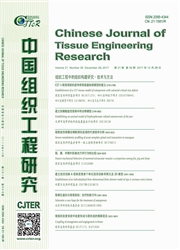

 中文摘要:
中文摘要:
背景:由于树鼩是介于食虫目和灵长目之间的代表,进化程度高,较价廉的灵长类动物,医学生物学的用途很高,已受到广大学者的重视。 目的:检测通常用的二抗能否与树鼩的血清发生免疫反应。 方法:用Western和ELISA的方法检测树鼩的血清是否与抗兔、抗羊、抗人、抗小鼠、抗大鼠、抗猴的二抗发生交叉反应。 结果与结论:Western 结果表明树鼩的血清与抗兔、抗羊、抗人、抗小鼠、抗大鼠的二抗均不发生反应,与抗猴的二抗有交叉反应。ELISA 的结果也表明树鼩的血清与抗猴的二抗有交叉反应,而与其他二抗没有交叉反应。结果说明通常卖的二抗不能用于树鼩IgG的免疫检测,只有抗猴的二抗与树鼩的血清发生交叉反应,必需制备抗树鼩IgG的单克隆和多克隆抗体,在没有现成抗体可用时,可采用抗猴的二抗替代检测,能在树鼩疾病动物模型的研究中得到广泛应用。
 英文摘要:
英文摘要:
BACKGROUND:Tree shrew is a representative between insectivore and primates, has a high degree of evolution, is more inexpensive primates, has high use of medical biology, and has been attached by scholars. OBJECTIVE:To detect whether the commonly used secondary antibodies have immune response with tree shrew serum. METHODS:Western blot assay and enzyme linked immunosorbent assay were utilized to detect whether the tree shrew serum had cross-reacts with anti-rabbit, anti-goat, anti-human, anti-mouse, anti-rat, and anti-monkey secondary antibodies. RESULTS AND CONCLUSION:Western blot assay results indicated that tree shrew serums did not react with anti-rabbit, anti-goat, anti-human, anti-mouse, and anti-rat secondary antibodies and had cross reaction with anti-monkey secondary antibody. Enzyme linked immunosorbent assay results also indicated that tree shrew serums were cross-reactive with anti-monkey secondary antibody, but did not have cross-reactivity with the other secondary antibodies. Above data confirmed that the usual y soled secondary antibody cannot be used to immunoassay with tree shrews IgG. Only anti-monkey secondary antibody has cross-react with tree shrew serum. It is necessary to prepare anti-tree shrew IgG monoclonal and polyclonal antibodies. When no antibody is readily available at present, anti-monkey secondary antibody can be used to substitute detection, and can be widely applied in the study of tree shrew models of disease.
 同期刊论文项目
同期刊论文项目
 同项目期刊论文
同项目期刊论文
 BDNF expression with functional improvement in transected spinal cord treated with neural stem cells
BDNF expression with functional improvement in transected spinal cord treated with neural stem cells Different Hematopoietic Reconstruction Abilities of Transplanted Cells from Bone Marrow, Spleen, Liv
Different Hematopoietic Reconstruction Abilities of Transplanted Cells from Bone Marrow, Spleen, Liv Liver Cells of GFP Transgenic Male Mice Transplantation to Reconstruct Hematopoietic Function in Fem
Liver Cells of GFP Transgenic Male Mice Transplantation to Reconstruct Hematopoietic Function in Fem Treatment with chicken-egg-white or whole-egg extracts maintains and enhances the survival and diffe
Treatment with chicken-egg-white or whole-egg extracts maintains and enhances the survival and diffe Stim1-and Orai1-mediated store-operated calcium entry is critical for angiotensin II-induced vascula
Stim1-and Orai1-mediated store-operated calcium entry is critical for angiotensin II-induced vascula Transplantation of bone marrow mesenchymal stem cells for the treatment of type 2 diabetes in a maca
Transplantation of bone marrow mesenchymal stem cells for the treatment of type 2 diabetes in a maca Screen-imaging guidance using a modified portable video macroscope for middle cerebral artery occlus
Screen-imaging guidance using a modified portable video macroscope for middle cerebral artery occlus HLA-A2-restricted Cytotoxic T Lymphocyte Epitopes from Human Hepsin as Novel Targets for Prostate Ca
HLA-A2-restricted Cytotoxic T Lymphocyte Epitopes from Human Hepsin as Novel Targets for Prostate Ca Comparative study among three different methods of bone marrow mesenchymal stem cell transplantation
Comparative study among three different methods of bone marrow mesenchymal stem cell transplantation Beneficial effects of non-matched allogeneic cord blood mononuclear cells upon patients with idiopat
Beneficial effects of non-matched allogeneic cord blood mononuclear cells upon patients with idiopat Engraftment of heavily transfused patients with severe aplastic anemia with a fludarabine-based regi
Engraftment of heavily transfused patients with severe aplastic anemia with a fludarabine-based regi 期刊信息
期刊信息
